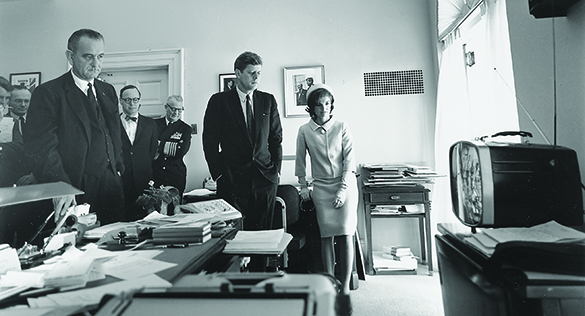| << Chapter < Page | Chapter >> Page > |

To counter Soviet influence in the developing world, Kennedy supported a variety of measures. One of these was the Alliance for Progress , which collaborated with the governments of Latin American countries to promote economic growth and social stability in nations whose populations might find themselves drawn to communism. Kennedy also established the Agency for International Development to oversee the distribution of foreign aid, and he founded the Peace Corps , which recruited idealistic young people to undertake humanitarian projects in Asia, Africa, and Latin America. He hoped that by augmenting the food supply and improving healthcare and education, the U.S. government could encourage developing nations to align themselves with the United States and reject Soviet or Chinese overtures. The first group of Peace Corps volunteers departed for the four corners of the globe in 1961, serving as an instrument of “soft power” in the Cold War.
Kennedy’s various aid projects, like the Peace Corps, fit closely with his administration’s flexible response , which Robert McNamara advocated as a better alternative to the all-or-nothing defensive strategy of mutually assured destruction favored during Eisenhower’s presidency. The plan was to develop different strategies, tactics, and even military capabilities to respond more appropriately to small or medium-sized insurgencies, and political or diplomatic crises. One component of flexible response was the Green Berets, a U.S. Army Special Forces unit trained in counterinsurgency —the military suppression of rebel and nationalist groups in foreign nations. Much of the Kennedy administration’s new approach to defense, however, remained focused on the ability and willingness of the United States to wage both conventional and nuclear warfare, and Kennedy continued to call for increases in the American nuclear arsenal.
Kennedy’s multifaceted approach to national defense is exemplified by his careful handling of the Communist government of Fidel Castro in Cuba. In January 1959, following the overthrow of the corrupt and dictatorial regime of Fulgencio Batista, Castro assumed leadership of the new Cuban government. The progressive reforms he began indicated that he favored Communism, and his pro-Soviet foreign policy frightened the Eisenhower administration, which asked the Central Intelligence Agency (CIA) to find a way to remove him from power. Rather than have the U.S. military invade the small island nation, less than one hundred miles from Florida, and risk the world’s criticism, the CIA instead trained a small force of Cuban exiles for the job. After landing at the Bay of Pigs on the Cuban coast, these insurgents, the CIA believed, would inspire their countrymen to rise up and topple Castro’s regime. The United States also promised air support for the invasion.

Notification Switch
Would you like to follow the 'U.s. history' conversation and receive update notifications?